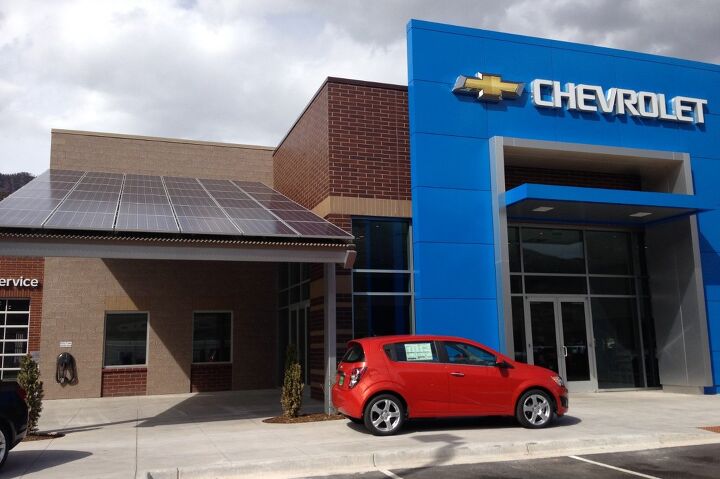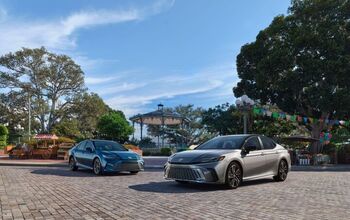2017 U.S. Auto Sales Forecasts Are Falling; Still Likely the Fourth-Best Year on Record
After U.S. sales of new vehicles declined 2 percent, year-over-year, through the first five months of 2017, forecasters surveyed by Bloomberg are largely in agreement. 2017 will fall well short of 2016’s record auto industry output, sliding to 17.2 million sales from more than 17.5 million in 2016.
There are nevertheless a handful of positives on which optimistic automakers can draw. First, a 17-million-unit sales year still represents a huge number of sales for manufacturers that averaged 12.5 million sales between 2008 and 2012.
Second, the high incentive spending doesn’t appear to be growing higher. Pair that with high average transaction prices and automakers can still earn big profits.
Third, if Washington ever does get around to legislating — no sure bet in this investigative congressional age — then promised tax cuts and infrastructure programs could further elevate demand.
In the meantime, there are causes for concern.
Inventory levels, according to Automotive News, improved in May, at least as compared with April, but remain high at General Motors and for many key models across the industry. At some point, in order to clear out, for instance, a 126-day supply of Buick LaCrosse sedans or a 118-day supply of Chevrolet Silverados, pressure will have to be placed on pricing. And when prices fall, competitors are forced to compete in order to maintain market share.
Adding pressure is a forthcoming glut of pre-owned, off-lease vehicles. Part of the boom in auto sales over the last few years is attributed to the rising number of lease customers. The lease returns and other factors are, “driving a lot of uncertainty and frankly the jitters across the industry,” LMC Automotive’s senior vice president of forecasting, Jeff Schuster, told Bloomberg, “because this is the first year and the first time that we’re pulling back on demand since the recession.”
Indeed, not since 2009 has the U.S. auto industry collectively reported fewer sales than in the previous year.
And while incentive spending is relatively stable from one month to the next, automakers are undeniably spending significant sums of money to lure customers into showrooms. ALG said May 2017’s incentive spending was up 9.5 percent, to $3,435, compared with May 2016. Yet average transaction prices were up just 1 percent, year-over-year.
If auto sales do in fact fall to 17.2 million units this year, 2017 will still go down as the fourth-highest-volume year on record. Only 2000, 2015, and 2016 scored higher.
Bloomberg’s forecaster average late last year stood at 17.2 million units, but optimism surrounding GOP tax proposals conspired to increase forecasts for 2017 to 17.4 million early in President Trump’s Oval Office tenure. At Morgan Stanley, meanwhile, the predicted decline in 2017 is just the beginning. The predicted decreases the auto industry will suffer in the following three years will be more substantial.
[Image: General Motors]
Timothy Cain is a contributing analyst at The Truth About Cars and Autofocus.ca and the founder and former editor of GoodCarBadCar.net. Follow on Twitter @timcaincars.
More by Timothy Cain
Latest Car Reviews
Read moreLatest Product Reviews
Read moreRecent Comments
- Kwik_Shift_Pro4X The dominoes start to fall...
- IBx1 Get the standard established, then stop building the chargers while you let others license the design from you to build more stations with your standard disgusting
- IBx1 “Dare to live more”-company that went from making the Countach and Diablo to an Audi crossover with an Audi engine and only pathetic automatic garabge ”live mas”-taco bell
- Pianoboy57 Not buying one of these new when I was a young guy was a big regret. I hated the job I had then so didn't want to commit to payments. I did own a '74 Corona SR later for a short time.
- FreedMike This wasn’t unpredictable. Despite what the eV HaTerZ kLuBB would like you to believe, EV sales are still going up, just not as quickly as they had been, but Tesla’s market share is down dramatically. That’s the result of what I’ve been saying for a long time: that the competition would eventually start catching up, and that’s exactly what’s happening. How did this happen? It boils down to this: we’re not back in 2019 anymore. Back then, if you wanted an EV that wasn’t a dorky looking ecomobile like a Leaf or Bolt, it was pretty much Tesla or bust, and buyers had to deal with all the endemic Tesla issues (build quality problems, bizarre ergonomics, weird styling, and so forth). That’s not the case today – there is a ton of competition, and while these newer models aren’t quite there when it comes to EV tech, they’re getting closer, and most of the Tesla weirdness just doesn’t apply. And then there’s this: stale product is the kiss of death in the car biz, and aside from the vanity project known as Cybertruck, all of Tesla’s stuff is old now. It’s not as “bleeding edge” as it used to be. For a company that made its’ bones on being on the forefront of tech, that’s a big problem.I don’t think Tesla is out of the game – not by a long shot. They’re still the market leader by a very wide margin, and their EV tech is the best in the game. But they need to stop focusing on stuff like the Cybertruck (technically fascinating, but it’s clearly an Elon Musk ego trip), the money/talent suck that is FSD, and the whole robotaxi thing, and put product first. At a minimum, everything they sell needs a very heavy refresh, and the entry level EV is a must.


































Comments
Join the conversation
Dealers/banks are supposedly tightening their lending standards. In the last few years, subprime borrowing/lax lending standards have certainly contributed to higher sales. I know a few people who have purchased new cars in the last 6 months. How they even remotely qualified for a loan is beyond me. I think this is going to have a bigger impact on future sales than people realize.
Either way, we have a good deal of inventory to last for a while. Buy a decent car soon and keep it for a while till we get another boom. Deals are so good right now, it makes even sense to buy new in some case (Hyundai Sonata)